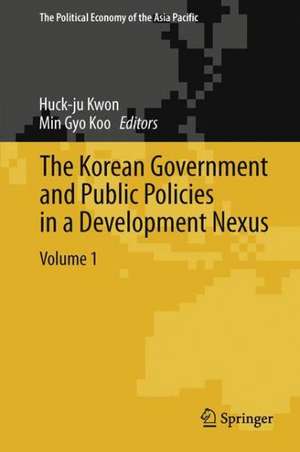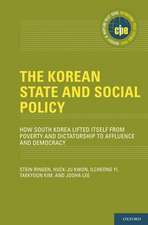The Korean Government and Public Policies in a Development Nexus, Volume 1: The Political Economy of the Asia Pacific
Editat de Huck-ju Kwon, Min Gyo Kooen Limba Engleză Hardback – 22 aug 2013
| Toate formatele și edițiile | Preț | Express |
|---|---|---|
| Paperback (1) | 379.68 lei 43-57 zile | |
| Springer International Publishing – 18 iun 2014 | 379.68 lei 43-57 zile | |
| Hardback (1) | 385.84 lei 43-57 zile | |
| Springer International Publishing – 22 aug 2013 | 385.84 lei 43-57 zile |
Din seria The Political Economy of the Asia Pacific
- 15%
 Preț: 649.06 lei
Preț: 649.06 lei - 18%
 Preț: 1224.36 lei
Preț: 1224.36 lei -
 Preț: 389.31 lei
Preț: 389.31 lei - 20%
 Preț: 550.14 lei
Preț: 550.14 lei - 15%
 Preț: 639.25 lei
Preț: 639.25 lei - 15%
 Preț: 639.25 lei
Preț: 639.25 lei - 18%
 Preț: 1217.54 lei
Preț: 1217.54 lei - 20%
 Preț: 566.76 lei
Preț: 566.76 lei - 23%
 Preț: 773.67 lei
Preț: 773.67 lei -
 Preț: 382.18 lei
Preț: 382.18 lei -
 Preț: 262.09 lei
Preț: 262.09 lei - 15%
 Preț: 652.17 lei
Preț: 652.17 lei - 15%
 Preț: 646.30 lei
Preț: 646.30 lei - 24%
 Preț: 631.51 lei
Preț: 631.51 lei - 18%
 Preț: 720.53 lei
Preț: 720.53 lei -
 Preț: 197.80 lei
Preț: 197.80 lei - 15%
 Preț: 637.13 lei
Preț: 637.13 lei -
 Preț: 369.48 lei
Preț: 369.48 lei
Preț: 385.84 lei
Nou
Puncte Express: 579
Preț estimativ în valută:
73.85€ • 80.25$ • 62.08£
73.85€ • 80.25$ • 62.08£
Carte tipărită la comandă
Livrare economică 21 aprilie-05 mai
Preluare comenzi: 021 569.72.76
Specificații
ISBN-13: 9783319010977
ISBN-10: 3319010972
Pagini: 148
Ilustrații: IX, 136 p. 14 illus. in color.
Dimensiuni: 155 x 235 x 14 mm
Greutate: 0.36 kg
Ediția:2014
Editura: Springer International Publishing
Colecția Springer
Seria The Political Economy of the Asia Pacific
Locul publicării:Cham, Switzerland
ISBN-10: 3319010972
Pagini: 148
Ilustrații: IX, 136 p. 14 illus. in color.
Dimensiuni: 155 x 235 x 14 mm
Greutate: 0.36 kg
Ediția:2014
Editura: Springer International Publishing
Colecția Springer
Seria The Political Economy of the Asia Pacific
Locul publicării:Cham, Switzerland
Public țintă
ResearchCuprins
Introduction:The Role of Government in Korea’s Economic and Social Transition.- Part IGovernment and Coordination for Development.- Institutional Presidency andNational Development.- Managing Economic Policy and Coordination: A Saga of theEconomic Planning Board.- Bureaucratic Power and Government Competitiveness.- PartII Public Policies for Development.- Governing the Developmental Welfare State:From Regulation to Provision.- Trade Policy for Development: Paradigm Shiftfrom Mercantilism to Liberalism.- Educational Policy, Development of Education,and Economic Growth in Korea.
Textul de pe ultima copertă
In the postwar period, Korea’s economic and social-political metamorphosis is a rare example of a successful transition from one of the world’s poorest developing countries to a highly sophisticated industrial society—an experience which many developing countries are keen to emulate. The change is particularly significant as Korea was able to reduce poverty and keep social inequality at a modest level during its rapid economic development. This volume analyzes the Korean transition in regards to the political and institutional foundation of its government and public policies. The government of Korea single-mindedly carried out public policies to stimulate economic growth, but the government and public policies have themselves been affected and changed by the process. The contention of this volume is that the transition of Korean society and the evolution of the Korean government are the results of two-way interactions. In this context, the volume analyzes the way in which the dynamics of public administration were shaped within the Korean government and the kinds of public policies and instruments that were adopted to encourage this economic and social development. This analysis will allow a more complete understanding of the economic and social transformation of Korea. Surprisingly, there is a paucity of research on this aspect—a gap which this volume seeks to fill. This volume shows that it is necessary to maintain consistency and coherence in government and public policy in order to achieve economic and social transformation, making it of interest to both scholars and policy-makers concerned with development in the Asia-Pacific.
Caracteristici
Examines the role of government in South Korea’s economic and social transformation during its developmental period Sheds new light on the political and institutional foundations of Korean government’s administrative capacities and pro-growth policies Investigates the link between public administration and socio-economic growth? Includes supplementary material: sn.pub/extras











